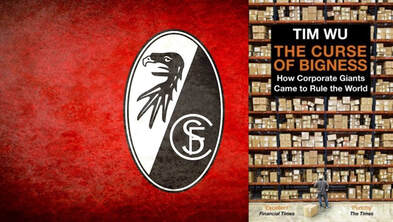
Mainstream economists would have come across the name over the last decade because it is the place most associated with Ordoliberalism. President Biden’s Special Assistant on Competition Policy is a fan. In his book The Curse of Bigness, Tim Wu devotes a few pages to the lessons that 21st century competition policy can learn from the ideas that originated in Freiburg. In outlining his philosophy, Wu uses the occasional sporting metaphor. In another publication he says “in leagues like the NFL or sports like boxing there has long been structural tools for protecting competition or ‘competitive parity’.“ Competition policy has obvious links to sports economics.
The title of Wu’s book is a reference to the words of a US Supreme Court Justices from the period between the two world wars of the 20th century. Louis Brandeis is the legal scholar who’s name is now used to describe the ideas of Tim Wu and others under the heading Neo-Brandeis. It was during the same period that legal scholars and economists came together in Freiburg to develop the ideas that have become known as Ordoliberalism or the Freiburg School. Unfortunately, their warning about the implications of the concentration of private power were too close to the mark.
There are obvious similarities between the ideas that govern the way we think about competition in the business and sporting spheres. I wonder what the scholars in 1930s Freiburg would think about 21st century competitive balance in the Bundesliga.
 RSS Feed
RSS Feed